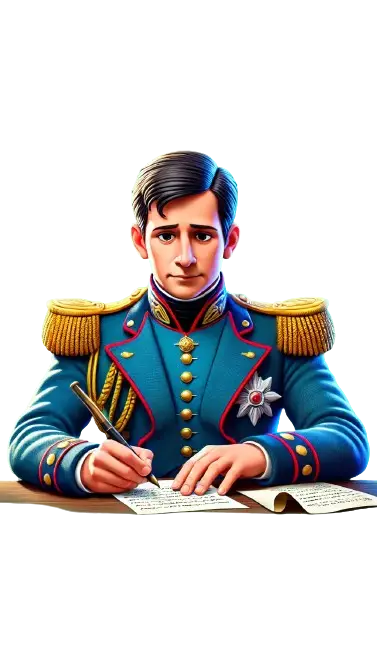The rise of Napoleon Bonaparte / Learn Spanish and English
Learn Spanish With History
Spanish Vocabulary
Press on each word below to discover its meaning
Grandeza / Greatness
Which means Greatness, The quality of being great, distinguished, or eminent. It often refers to someone or something that is outstanding in size, achievement, or importance.
The Phrase in this Story Napoleón Bonaparte soñaba con la grandeza
Revolución / Revolution
Which means Revolution, A fundamental and relatively sudden change in political power, social structure, or economic conditions. It can also refer to major changes or developments in any field, like the Industrial Revolution.
The Phrase in this Story en la Revolución Francesa
Carisma / Charisma
Which means Charisma, A compelling attractiveness or charm that can inspire devotion in others. It refers to a personal quality that makes someone likable or influential.
The Phrase in this Story destacándose por su brillantez militar y su carisma.
Reformas / Reforms
Which means Reforms, Changes made to improve a system, organization, or practice. It usually refers to efforts to correct problems, update outdated practices, or introduce new policies.
The Phrase in this Story iniciando una era de reformas
Modernizó / Modernized
Which means Modernized, Past tense of “to modernize,” meaning to make something more current or up-to-date. It often refers to adopting new technologies, ideas, or methods.
The Phrase in this Story Napoleón modernizó la administración y el sistema legal francés
Ambición / Ambition
Which means Ambition, A strong desire to achieve something, typically requiring determination and hard work. It refers to the drive or aspiration to reach a goal or succeed.
The Phrase in this Story Su ambición lo llevó a una serie de victorias asombrosas
Combinadas / Combined
Which means Combined, Joined or merged together to form a single entity. It refers to the process or result of bringing different elements together.
The Phrase in this Story donde derrotó a las fuerzas combinadas de Austria y Rusia.
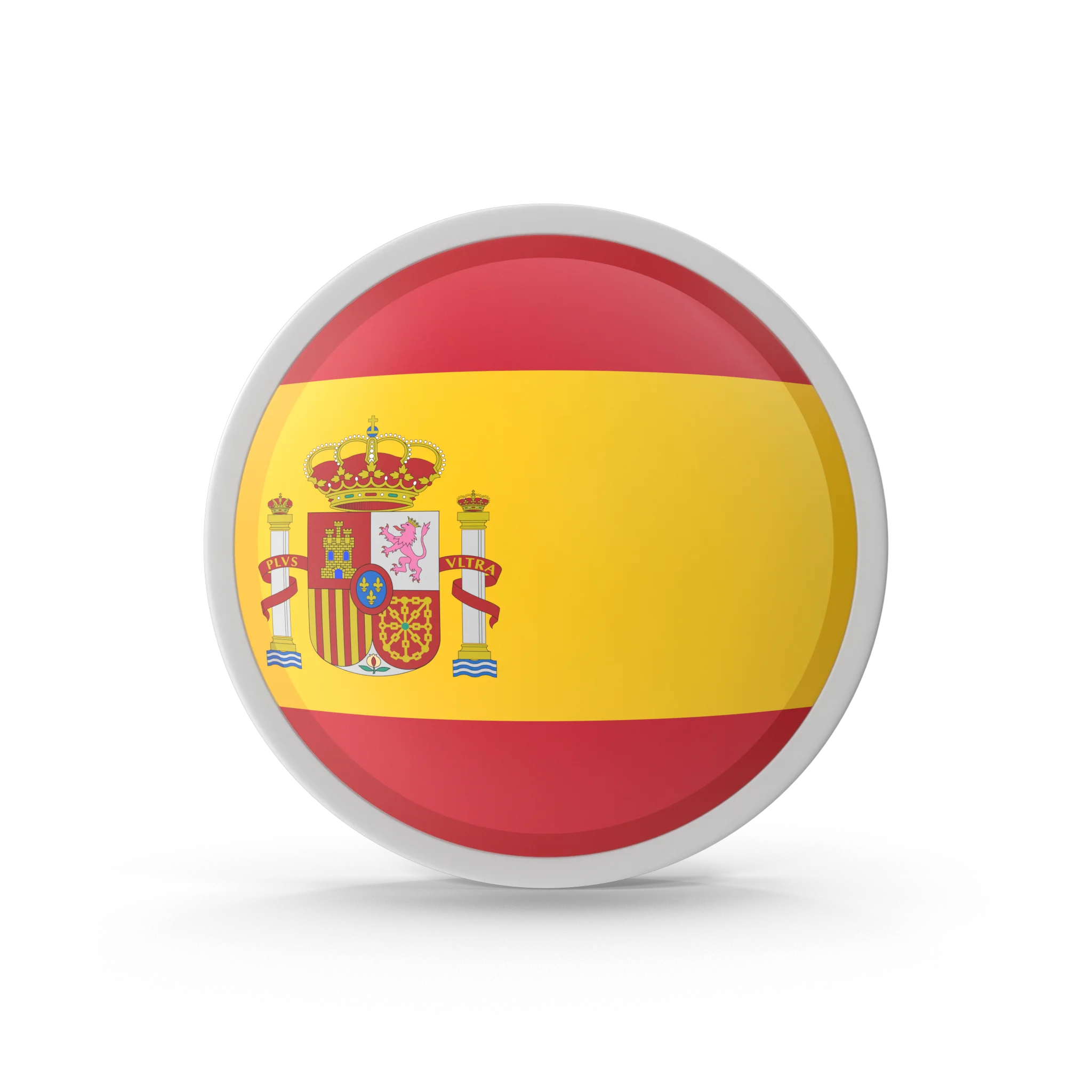
El ascenso De Napoleon Bonaparte
Learn and improve your Spanish and English Through Stories
El ascenso de Napoleon Bonaparte Spanish Version
Napoleón Bonaparte: De Córcega al Imperio
En las costas rocosas de Córcega, una isla en el Mediterráneo, un joven llamado Napoleón Bonaparte crecía soñando con la gloria. Nacido en 1769 en una familia noble de origen italiano, la vida de Napoleón no estaba destinada a ser fácil. La isla de Córcega acababa de ser anexionada por Francia, y las tensiones entre corsos y franceses eran palpables. A pesar de estas circunstancias, o quizás debido a ellas, Napoleón desarrolló una ambición feroz, alimentada por sus estudios en las mejores academias militares de Francia.
A los 24 años, en pleno apogeo de la Revolución Francesa, Napoleón ya había comenzado a destacar como uno de los oficiales más prometedores del ejército revolucionario. En 1793, su victoria en el sitio de Tolón le valió la atención de los líderes de la Revolución, quienes pronto lo ascendieron al rango de general de brigada. No solo era un comandante brillante en el campo de batalla, sino que también poseía un carisma natural que le permitía ganarse la lealtad de sus hombres y el respeto de sus superiores.
El ascenso al poder
La Francia de la década de 1790 era un hervidero de caos político y social. La monarquía había sido derrocada, pero el país estaba sumido en el terror y la incertidumbre. En este ambiente inestable, Napoleón vio una oportunidad. En 1799, tras una serie de victorias militares en Italia y Egipto, regresó a Francia como un héroe. Aprovechando su prestigio, orquestó un golpe de Estado que lo llevaría a convertirse en Primer Cónsul, el líder indiscutible de la nación. Con solo 30 años, Napoleón tenía en sus manos el control absoluto de Francia.


Napoleón no tardó en consolidar su poder. A través de reformas rápidas y eficaces, reorganizó el sistema administrativo del país, fortaleciendo su control sobre las instituciones clave del gobierno. Pero su ambición iba mucho más allá de simplemente gobernar; quería transformar Francia en una potencia imparable. Así, en 1804, decidió dar el siguiente paso lógico: se coronó a sí mismo emperador, estableciendo un nuevo imperio en el corazón de Europa.
Reformas que trascendieron el tiempo
Aunque es recordado principalmente por sus hazañas militares, el legado de Napoleón va mucho más allá del campo de batalla. Uno de sus logros más perdurables fue la creación del Código Napoleónico, una reforma profunda del sistema legal francés. Este conjunto de leyes no solo modernizó Francia, sino que también influyó en la estructura legal de muchos países alrededor del mundo, incluyendo América Latina y Europa. El Código establecía principios como la igualdad ante la ley, la propiedad privada y la separación de la Iglesia y el Estado, fundamentos que aún resuenan en los sistemas jurídicos actuales.
Además de sus reformas legales, Napoleón modernizó la administración pública, creando un estado centralizado que funcionaba con una eficiencia sin precedentes. Su enfoque era claro: hacer de Francia un país moderno, organizado y capaz de sostener su expansión territorial. Bajo su mando, se reorganizó el sistema educativo, se mejoró la infraestructura y se fomentó el desarrollo económico, sentando las bases de lo que sería el Estado moderno francés.
Las grandes campañas y la Batalla de Austerlitz
Con Francia modernizada y su poder consolidado, Napoleón se lanzó a una serie de campañas militares que lo harían famoso en toda Europa. En 1805, en la Batalla de Austerlitz, una de sus victorias más asombrosas, Napoleón derrotó a las fuerzas combinadas de Austria y Rusia en lo que se conoce como su “batalla perfecta”. Esta victoria no solo consolidó su reputación como estratega militar, sino que también reafirmó el poder de Francia sobre el continente.

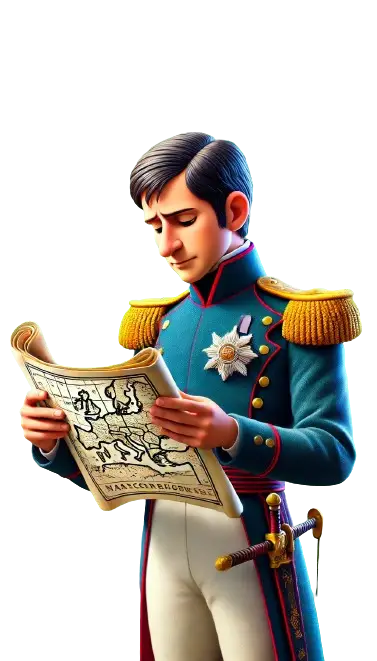
La Batalla de Austerlitz, librada el 2 de diciembre de 1805, se convirtió en un ejemplo del genio táctico de Napoleón. Su capacidad para engañar y maniobrar a una fuerza numéricamente superior se convirtió en un modelo para futuras operaciones militares. La batalla es considerada una de las mayores obras maestras tácticas de la historia, y aseguró la posición de Napoleón como el maestro de Europa.
Tras Austerlitz, el imperio de Napoleón alcanzó su apogeo, y su reputación como líder invencible se extendió por todo el continente. La victoria desmanteló la Tercera Coalición contra Francia y condujo al Tratado de Pressburg, que aumentó significativamente la influencia francesa en Europa. Por un tiempo, Napoleón parecía imparable.
Conclusión
Para cuando Napoleón triunfó en Austerlitz, ya había transformado a Francia en una potencia dominante en Europa. Su brillantez militar, sus reformas políticas y su ambición inquebrantable le permitieron moldear el futuro de Europa. El Código Napoleónico y la centralización del Estado sentaron las bases del gobierno moderno, mientras que sus campañas militares redefinieron la guerra. Pero aunque Austerlitz marcó el pico de su poder, el camino que tenía por delante pronto se tornaría más peligroso.
La historia del ascenso de Napoleón es una de ambición, estrategia y visión. Sin embargo, su impulso implacable lo llevaría a enfrentar desafíos aún mayores. El próximo capítulo en la vida de Napoleón lo pondría a prueba como nunca antes, enfrentando los peligros de la sobreextensión y la creciente resistencia de una Europa cada vez más unida.


The rise of Napoleon Bonaparte
Aprende y mejora tu español e ingles a travez de historias
The rise of Napoleon Bonaparte English Version
Napoleon Bonaparte: From Corsica to Empire
On the rocky shores of Corsica, an island in the Mediterranean, a young boy named Napoleon Bonaparte grew up dreaming of glory. Born in 1769 to a noble family of Italian descent, Napoleon’s life was not destined to be easy. The island of Corsica had just been annexed by France, and tensions between the Corsicans and the French were palpable. Despite these challenges, or perhaps because of them, Napoleon developed a fierce ambition, fueled by his studies at France’s top military academies.
At the age of 24, in the midst of the French Revolution, Napoleon had already begun to distinguish himself as one of the most promising officers of the revolutionary army. In 1793, his victory at the Siege of Toulon earned him the attention of the revolutionary leaders, who soon promoted him to brigadier general. Not only was he a brilliant commander on the battlefield, but he also possessed a natural charisma that earned him the loyalty of his men and the respect of his superiors.
The Rise to Power
France in the 1790s was a cauldron of political and social chaos. The monarchy had been overthrown, but the country was mired in terror and uncertainty. In this unstable environment, Napoleon saw an opportunity. In 1799, after a series of military victories in Italy and Egypt, he returned to France as a hero. Seizing on his newfound prestige, he orchestrated a coup d’état that led him to become First Consul, the undisputed leader of the nation. At just 30 years old, Napoleon held absolute power in France.

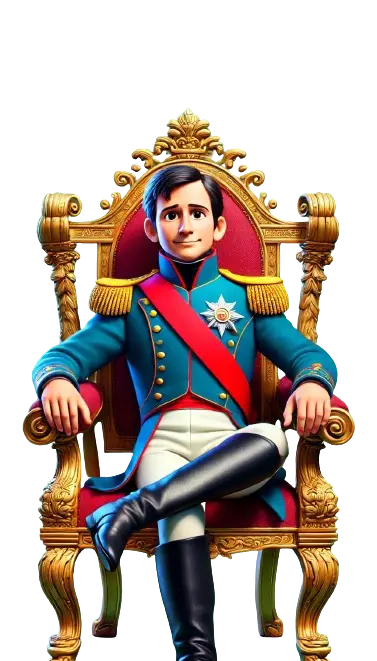
Napoleon wasted no time in consolidating his authority. Through swift and effective reforms, he reorganized the country’s administrative system, strengthening his control over key government institutions. But his ambition extended far beyond simply governing; he wanted to transform France into an unstoppable power. Thus, in 1804, he took the next logical step: he crowned himself Emperor, establishing a new empire at the heart of Europe.
Reforms That Transcended Time
While he is most remembered for his military feats, Napoleon’s legacy goes far beyond the battlefield. One of his most enduring achievements was the creation of the Napoleonic Code, a profound reform of the French legal system. This set of laws not only modernized France but also influenced the legal structure of many countries around the world, including those in Latin America and Europe. The Code established principles such as equality before the law, private property rights, and the separation of church and state, foundations that still resonate in today’s legal systems.
In addition to his legal reforms, Napoleon modernized public administration, creating a centralized state that operated with unprecedented efficiency. His focus was clear: to make France a modern, organized country capable of sustaining its territorial expansion. Under his leadership, the education system was reorganized, infrastructure was improved, and economic development was encouraged, laying the groundwork for what would become the modern French state.
The Great Campaigns and the Battle of Austerlitz
With France modernized and his power consolidated, Napoleon embarked on a series of military campaigns that would make him famous across Europe. In 1805, at the Battle of Austerlitz, one of his most stunning victories, Napoleon defeated the combined forces of Austria and Russia in what is often called his “perfect battle.” This victory not only cemented his reputation as a brilliant military strategist but also reaffirmed France’s dominance over the continent.
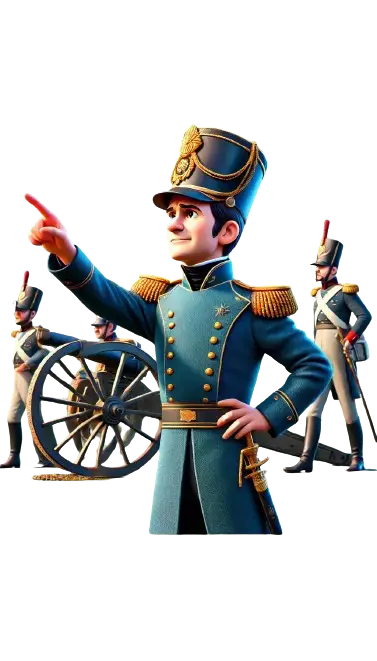
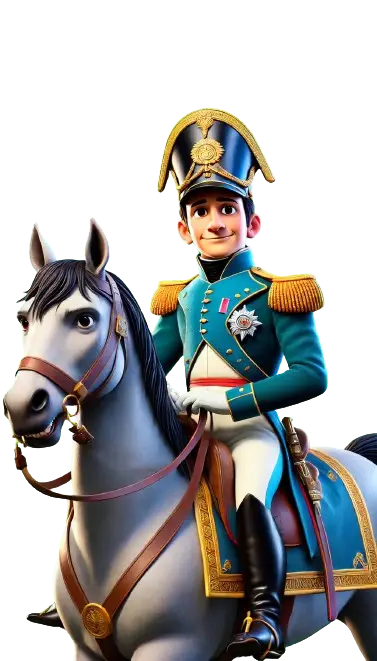
The Battle of Austerlitz, fought on December 2, 1805, became a hallmark of Napoleon’s genius in warfare. His ability to deceive and outmaneuver a numerically superior force became the blueprint for many future military operations. The battle is often cited as one of the greatest tactical masterpieces in history, and it secured Napoleon’s position as the master of Europe.
Following Austerlitz, Napoleon’s empire reached its zenith, and his reputation as an invincible leader spread across the continent. The victory dismantled the Third Coalition against France and led to the Treaty of Pressburg, which significantly increased French influence in Europe. For a time, Napoleon appeared unstoppable.
Conclusion
By the time Napoleon triumphed at Austerlitz, he had already transformed France into a dominant European power. His military brilliance, political reforms, and unrelenting ambition allowed him to shape the future of Europe. The Napoleonic Code and his centralization of the state laid the foundations for modern governance, while his military campaigns redefined warfare. But while Austerlitz marked the peak of his power, the path ahead would soon become more treacherous.
The story of Napoleon’s rise is one of ambition, strategy, and vision. However, his unyielding drive would lead him into even greater challenges. The next chapter in Napoleon’s life would test him like never before, as he faced the perils of overextension and growing resistance from an increasingly unified Europe.
